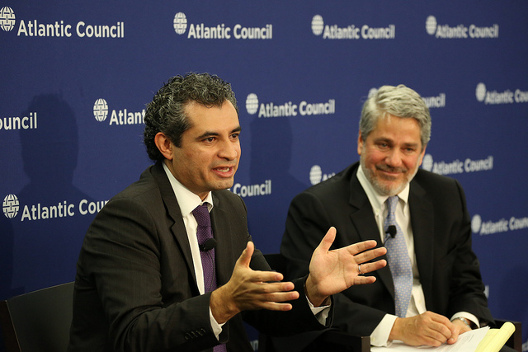 Mexico is poised to expand its oil production so dramatically that it may become one of the world’s most strategically important oil exporters within the next decade, US analysts and a top Mexican official told a conference at the Atlantic Council. Mexico’s decision this year to end the 75-year monopoly of the state-owned company PEMEX, and to invite private and foreign investors into its energy market, will put the country into close competition with Colombia and Brazil as the Western Hemisphere’s most-sought destinations for energy investment, according to David Goldwyn, the State Department’s former special envoy and coordinator for international energy affairs. Goldwyn, who authored “Mexico Rising: Comprehensive Energy Reform at Last?” a report for the Atlantic Council’s Adrienne Arsht Latin America Center, presented his findings at the report’s launch event on December 19.
Mexico is poised to expand its oil production so dramatically that it may become one of the world’s most strategically important oil exporters within the next decade, US analysts and a top Mexican official told a conference at the Atlantic Council. Mexico’s decision this year to end the 75-year monopoly of the state-owned company PEMEX, and to invite private and foreign investors into its energy market, will put the country into close competition with Colombia and Brazil as the Western Hemisphere’s most-sought destinations for energy investment, according to David Goldwyn, the State Department’s former special envoy and coordinator for international energy affairs. Goldwyn, who authored “Mexico Rising: Comprehensive Energy Reform at Last?” a report for the Atlantic Council’s Adrienne Arsht Latin America Center, presented his findings at the report’s launch event on December 19.
Mexican Undersecretary of Hydrocarbons Enrique Ochea Reza detailed the reforms in a presentation at the conference. He said Mexico should be able to dramatically increase its oil production. The Undersecretary noted the volatile political battle the Congress went through in order to pass these reforms and detailed some of the compromises within them. As the report notes, Mexico relies on PEMEX for a third of its national revenue, much of which is used to fund social programs. Undersecretary Ochea explained the mandates within the reform that dedicate a percentage of oil revenue (expected to increase as a result of said reforms) to programs such as education, the pension fund, and research.
Undersecretary Ochea’s Presentation
The reform will give US companies a chance to invest heavily as Mexico’s oil and gas fields are nearby and share geology with the United States, said Goldwyn. “Most significant from a US foreign policy perspective, however, is the promise of economic prosperity for Mexico that comes with energy reform. The United States does better with a strong Mexico in economic terms, security terms, and even domestically in regard to polarizing issues around immigration,” the report said.
In a discussion moderated by the center’s director, Peter Schechter, Goldwyn and Ochea were joined by Duncan Wood, Director of the Mexico Institute at Woodrow Wilson International Center for Scholars, and Jorge Piñón of the University of Texas at Austin. Piñón directs the university’s Center of International Energy and Environmental Policy.
While noting the benefits of the reform, passed this year under the administration of President Enrique Peña Nieto, the panelists emphasized the work still to be done: while constitutional reforms permit the creation of foreign investment and oversight bodies, the actual infrastructure for these systems has yet to be established. Goldwyn noted that in enacting the reform, Mexico will have to overcome entrenched bureaucracies and a tradition of close state protection for PEMEX. If successful, the reforms are projected to add 2.5 million jobs and two percentage points to Mexico’s GDP growth by 2025.
Photos from the Event
